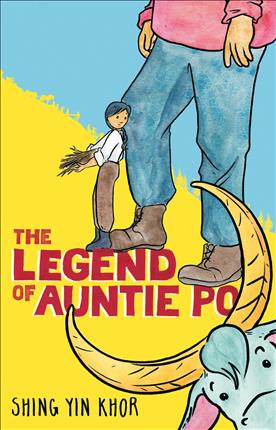| Legend of Auntie Po Author: Khor, Shing Yin | ||
| Price: $10.65 | ||
Summary:
Aware of the racial tumult in the years after the passage of the Chinese Exclusion Act, Mei tries to remain blissfully focused on her job, her close friendship with the camp foreman's daughter, and telling stories about Paul Bunyan--reinvented as Po Pan Yin (Auntie Po), an elderly Chinese matriarch. In graphic novel format.
| Accelerated Reader Information: Interest Level: MG Reading Level: 2.80 Points: 1.0 Quiz: 512312 |
Full Text Reviews:
Booklist - 04/15/2021 In a mountain logging camp in 1882, Chinese American Mei and her father run the camp kitchen and make delicious meals for the workers after their days of laboring. Mei makes the pies and regales the camp’s children with stories, including the legend of Po Pan Yin, an elderly Chinese woman who logs the forest with her giant blue ox. Mei is accused of stealing Paul Bunyan, but Mei molds Auntie Po into her own guardian spirit. Mei must navigate an increasingly dangerous world after passage of the Chinese Exclusion Act, as well as her friendship with and growing romantic feelings for Bee, the daughter of the boss. On the surface, this story is the birth of a folktale, but the author explores much deeper topics: grief, family, loyalty, racism, and self-discovery. Mei’s journey tugs at the heartstrings, and, while we want her to get her heart’s desires, the ending reflects a more realistic outcome for Mei and Bee. Watercolors are beautiful and illustrations are crisp and simple, conveying a childlike air while tackling serious subject matter. - Copyright 2021 Booklist.
School Library Journal - 07/09/2021 Gr 5–8—In Sierra Nevada in 1885, three years after the passing of the Chinese Exclusion Act, 13-year-old pie maker Mei helps her father run the logging camp's kitchen. Mei, who is Chinese, also spends time with her best friend Beatrice (Bee) Andersen, who is white, and masterfully spins tall tales about a female Chinese folk hero named Po Pan Yin, aka Auntie Po, and her blue buffalo Pei Pei. As Mei grapples with her growing feelings for Bee, she suddenly starts to see Auntie Po and Pei Pei in real life. Rising racial tension in the area reaches a boiling point when Chinese cook Ah Sam and another Chinese worker are attacked on their way back to the logging camp. Changes are coming to Mei's life, and even the mother of all loggers, Auntie Po, can only do so much to help. The author interweaves fabulism and historical fiction into a well-designed, evenly paced, stirring narrative. There is a strong sense of place, thanks to stunning watercolors and Mei's informative narration of how a logging camp is run. The Auntie Po stories add a layer of humor or poignancy and act as an emotional channel for Mei's internal struggles. Mei's gradual queer awakening is treated sensitively as an important part of her story line. Mei; her father, Hao; Ah Sam; and some background logging camp characters are of Chinese heritage; the majority of the rest of lumberjacks are white; and there is a Black family living at the camp as well. VERDICT A moving read that skillfully explores themes of racism, privilege, and identity. A must for all libraries.—Pearl Derlaga, York County P.L., VA - Copyright 2021 Publishers Weekly, Library Journal and/or School Library Journal used with permission.


